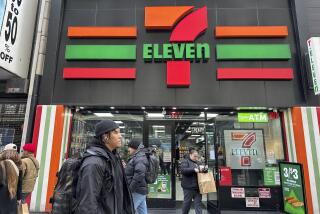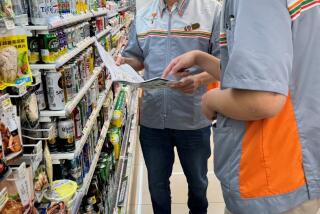Japanese May Buy 75% of 7-Eleven’s Parent Firm : Acquisition: Deal would represent the biggest Japanese investment in a U.S. retailer. To succeed it must be approved by Southland Corp. bondholders.
- Share via
The financially strapped parent of the 7-Eleven convenience store chain, Southland Corp., announced Thursday that it has agreed to sell 75% of the company to its longtime Japanese partner in a tentative deal roughly valued at more than $750 million.
If completed, the acquisition would be the biggest Japanese investment ever in a U.S. retailer. The proposal was announced one week after another Japanese company disclosed plans to buy a major stake in the fashionable Saks Fifth Avenue clothing chain.
However, some called the buyout agreement between Southland and Ito-Yokado Co. simply the beginning of negotiations among the companies and investors holding the Dallas firm’s junk bonds. The current terms call for Ito-Yokado and its 7-Eleven Japan Co. subsidiary to invest $400 million in cash and assume the junk bond debt remaining from the deal that turned Southland into a private company in 1987.
For the Southland acquisition to succeed, investors owning at least 95% of various categories of Southland junk bonds would have to give their approval.
That consent, analysts said, could be hard to obtain because the proposal offers relatively little in the way of financial incentives to bondholders. Under the current plan, bondholders overall would get 10% of the company and some securities, but they would have to give up bonds paying interest of more than 15% annually.
“I hope the negotiating positions of all the parties are flexible. Otherwise, this could end up in bankruptcy,” said Robert E. Lupo, head of high-yield bond research at Smith Barney, Harris Upham & Co. in New York.
Southland, parent of the world’s biggest network of conveniences stores, has been brought to the brink of collapse largely by the huge interest payments stemming from the $4.9-billion management buyout in 1987. At the time, Southland was maneuvering to avert a takeover by Canadian investor Samuel Belzberg.
But Southland, along with the Campeau Corp. department stores and others in the currently battered U.S. retailing industry, took on junk bond debt after overestimating how much business it would do in coming years. “It was part of the frenzy of the ‘80s,” said Carol Palmer, an analyst with Duff & Phelps in Chicago.
Instead of prospering, Southland was hit hard by stepped-up competition from supermarket and drugstore chains and from oil firms that opened up convenience stores of their own.
In November, Southland acknowledged that it faced a cash crisis and began working on a corporate overhaul. As part of that overhaul, it sold its 58 stores in Hawaii for $75 million to Ito-Yokado’s 7-Eleven Japan unit.
In addition, Southland entered into negotiations to sell its 50% stake in Citgo Petroleum Corp. for $661.5 million to Petroleos de Venezuela S.A., the state-owned oil company.
Still, with big bond interest payments coming due in June, Southland kept looking for an acquirer.
In Ito-Yokado, Southland is working with what it termed the second-largest, but most profitable, “superstore” and supermarket chain operator in Japan. Along with its 50.3% stake in 7-Eleven Japan, Ito-Yokado owns a 51% interest in Denny’s Japan Co. Overall, Ito-Yokado employs more than 38,700 full- and part-time workers.
The 7-Eleven Japan unit is the largest convenience store company in Japan.
Overall, Southland is the owner or franchiser of 7,000 convenience stores and has agreements with affiliates that operate an additional 5,900 outlets in the United States and 21 other countries.
The company, founded 62 years ago, has long been considered a pillar of Dallas’ business establishment and is 94% owned or controlled by the city’s Thompson family. Observers said the purchase of majority control of the company by Japanese interests might in some circles be considered a blow to the community. The Thompsons would be left with only 15% of Southland.
“I’m sure there’ll be people who express concern, but you have to remember that this is a company with whom Southland has had a long-term relationship,” Robert Mead, a Southland spokesman, said.
Although Japanese investors have spent enormous sums in U.S. real estate, banks and industrial companies, they have been reluctant to make large direct investments in American retailers. So far, the biggest such investment has been Jusco’s purchase of Talbots, an apparel chain, for $325 million in 1988.
Analysts have said that Japanese retailers have shied away from U.S. investments out of concern that they are not familiar enough with American consumer tastes. On Thursday, however, some industry experts suggested that Japanese buyers may now be on the prowl for U.S. merchandisers.
Louis J. Grabowsky, a partner in the Dallas office of the accounting firm Arthur Andersen & Co., said that Japanese investors with long-term strategies are likely to be interested in some U.S. retailers with short-term cash problems, such as Southland and the Campeau chains.
Another analyst added that the yen’s weak value recently may be prodding Japanese investors to act quickly, before the currency sinks even further, driving up the cost of overseas investments.
Southland officials, in a news release, said a restructuring of the company “is critical because of changing industry conditions which have strained the capital structure of Southland.”
They added that the company has already announced that “without a successful restructuring of its debt, it will face a significant liquidity crisis,” a statement some analysts took as a signal of a possible bankruptcy filing.
Although Ito-Yokado’s proposal would give it a majority of the seats on Southland’s board, officials said current management would continue to run the company.
In a prepared statement, Masatoshi Ito, president of Ito-Yokado and chairman of 7-Eleven Japan, said: “We will maintain and build upon our mutually strong market positions by combining the operating skills and strategic thinking of the American and Japanese companies. We are looking forward to working even more closely with the employees, franchises and licensees of Southland.”
John P. Thompson, Southland’s chairman, said: “We believe this strategic alliance, which will bring an infusion of $400 million in capital to Southland, is the best way to achieve the company’s goals.
“The infusion will enable the company to go forward with vital capital improvements, as well as the advertising and promotion programs that are so important in today’s competitive convenience retailing environment. We believe this transaction is necessary to preserve the business we’ve built.”
More to Read
Inside the business of entertainment
The Wide Shot brings you news, analysis and insights on everything from streaming wars to production — and what it all means for the future.
You may occasionally receive promotional content from the Los Angeles Times.










